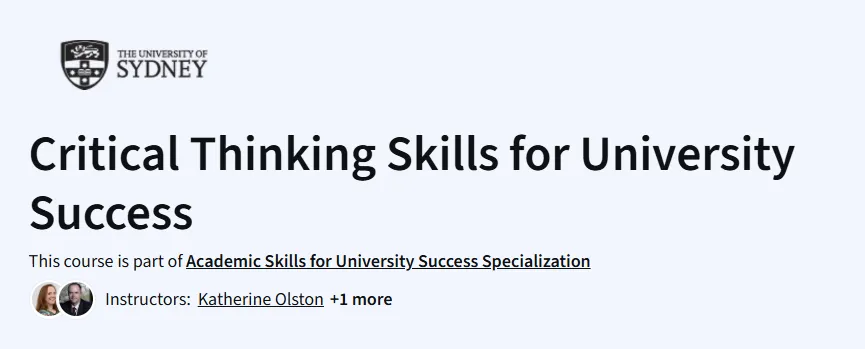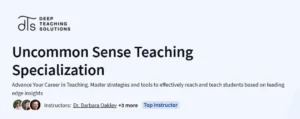What will you learn in Critical Thinking Skills for University Success Course
How to apply fundamental principles of critical thinking to everyday decisions.
Concepts from cognitive psychology and decision science to make better choices.
Recognition of cognitive biases and how to mitigate their effects.
Logical and probabilistic reasoning to interpret data and arguments critically.
Program Overview
Module 1: Introduction to Mindware
⏱️ 1 week
Topics: Importance of mental tools, rational thinking, intuitive errors.
Hands-on: Reflect on everyday reasoning mistakes and reframe them with new logic.
Module 2: The Psychology of Decision Making
⏱️ 1 week
Topics: Heuristics, biases, framing effects, overconfidence.
Hands-on: Analyze case studies that demonstrate flawed decision-making.
Module 3: Causal Reasoning
⏱️ 1 week
Topics: Correlation vs. causation, confounding variables, experiments.
Hands-on: Examine real-life research claims and test their causal strength.
Module 4: The Power of Statistics
⏱️ 1 week
Topics: Probability, base rates, regression to the mean, Bayesian reasoning.
Hands-on: Solve logic puzzles and estimate outcomes using statistical reasoning.
Module 5: Science and Skepticism
⏱️ 1 week
Topics: Scientific method, hypothesis testing, scientific skepticism.
Hands-on: Critically evaluate “scientific” claims in the media.
Module 6: Application and Integration
⏱️ 1 week
Topics: Combining mental tools for life decisions in law, business, and relationships.
Hands-on: Apply a framework to a real-world decision or dilemma.
Get certificate
Job Outlook
High relevance across roles requiring decision-making, research, education, policy, and leadership.
In-demand skill in tech, business analysis, journalism, law, and public administration.
Enhances both freelance and team collaboration opportunities.
Median salary boost possible for roles emphasizing data interpretation, problem-solving, and strategic planning.
Specification: Critical Thinking Skills for University Success
|
FAQs
- No prior university experience required.
- Focuses on reasoning, logic, and decision-making skills.
- Suitable for high school, undergraduate, and lifelong learners.
- Emphasizes practical application in academics and everyday life.
- Includes exercises to recognize and correct cognitive biases.
- Covers heuristics, overconfidence, and framing effects.
- Techniques for reflective thinking and self-correction.
- Case studies demonstrating flawed decision-making.
- Practical exercises to apply bias recognition in daily life.
- Prepares learners for improved judgment in academic and professional contexts.
- Teaches probabilistic reasoning and base rates.
- Explains regression to the mean and Bayesian thinking.
- Exercises in evaluating arguments and data critically.
- Provides frameworks to assess causation versus correlation.
- Enhances ability to make data-informed decisions.
- Improves academic performance in writing, research, and analysis.
- Strengthens skills for decision-making and problem-solving in work environments.
- Prepares learners for careers in law, business, research, and policy.
- Builds confidence in interpreting complex information.
- Certificate demonstrates mastery of critical thinking concepts.
- 6 modules: Mindware, Decision Psychology, Causal Reasoning, Statistics, Science & Skepticism, Application & Integration.
- Each module: ~1 week at a moderate pace.
- Self-paced with lifetime access.
- Hands-on exercises included in every module.
- Total duration: ~6 weeks.





